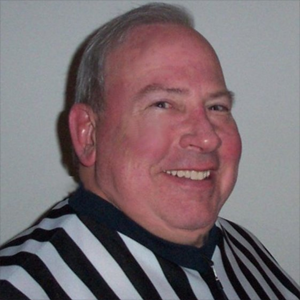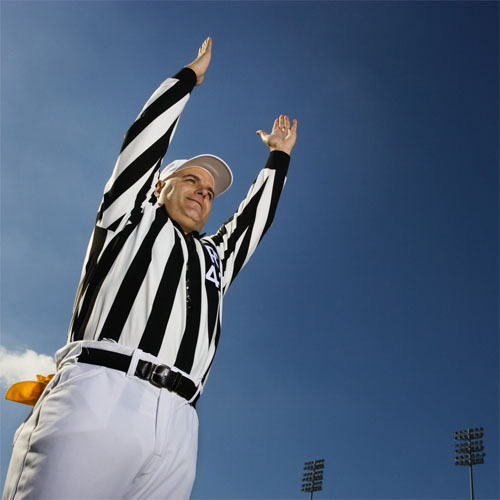
Rndballref
20 Years Experience
Chicago, IL
Male, 60
For twenty years I officiated high school, AAU and park district basketball games, retiring recently. For a few officiating is the focus of their occupation, while for most working as an umpire or basketball referee is an avocation. I started ref'ing to earn beer money during college, but it became a great way to stay connected to the best sports game in the universe. As a spinoff, I wrote a sports-thriller novel loosely based on my referee experiences titled, Advantage Disadvantage
Normally, contact after a blocked shot would be considered incidental. So unless the contact is intentional or extremely harsh I would let it go.
A player is allowed to fumble the ball after gaining possession, and then dribble if he has not dribbled heretofore. BUT, the fumble has to be unintentional in the eyes of the official.
In NFHS rules replay is not to be used in ordinary season games. However, replay use is permitted in a state's playoff series under these conditions: 1) the state has authorized its use, 2) the replay is used to determine timing issues on the last shot, and whether it is a 2 or 3 point shot. So in high school ball during an in season game you cannot use replay. In college, the officials use it a few times a game for many situations (flagarant or not on a hard foul, timing issues as to whether a shot was launched before time expired, who is the correct free shooter, etc.)
The dribble ends when the ball is knocked away, and so does player possession. So, if you pick up the ball and dribble it is not double dribble. You can pick up a ball with two hands as long as you are lifting up. If you push down with two hands it is double dribble.
Football Official
 Do you think it's ok for NFL refs to play fantasy football?
Do you think it's ok for NFL refs to play fantasy football?
Server / Bartender
 How much more do female servers get tipped?
How much more do female servers get tipped?
Forensic Scientist
 When did you know you wanted to work with the dead?
When did you know you wanted to work with the dead?
If the bench encroached on Team B's ability to make a play then yes, I would call a T. But normally, the desperate attempt will not occur anywhere near the bench and I would ignore the potential infraction.
I know the NFHS rules but I found this online from SB Nation regarding college reviews:
...now the following types of plays will be eligible:
shot clock violations in final 2 minutes or overtime
out of bounds plays in final 2 minutes or overtime
two point vs three points
which player committed a called foul (to make sure the correct player is assessed)
flagrant foul calls
NOTE: this list does not include intentional so if this correct it would seem to be excluded. maybe someone can post a more definitive answer?
In all the high school games I worked I probably saw the box and 1 a couple times.
-OR-
 Login with Facebook
Login with Facebook (max 20 characters - letters, numbers, and underscores only. Note that your username is private, and you have the option to choose an alias when asking questions or hosting a Q&A.)
(A valid e-mail address is required. Your e-mail will not be shared with anyone.)
(min 5 characters)
By checking this box, you acknowledge that you have read and agree to Jobstr.com’s Terms and Privacy Policy.
-OR-
 Register with Facebook
Register with Facebook(Don't worry: you'll be able to choose an alias when asking questions or hosting a Q&A.)